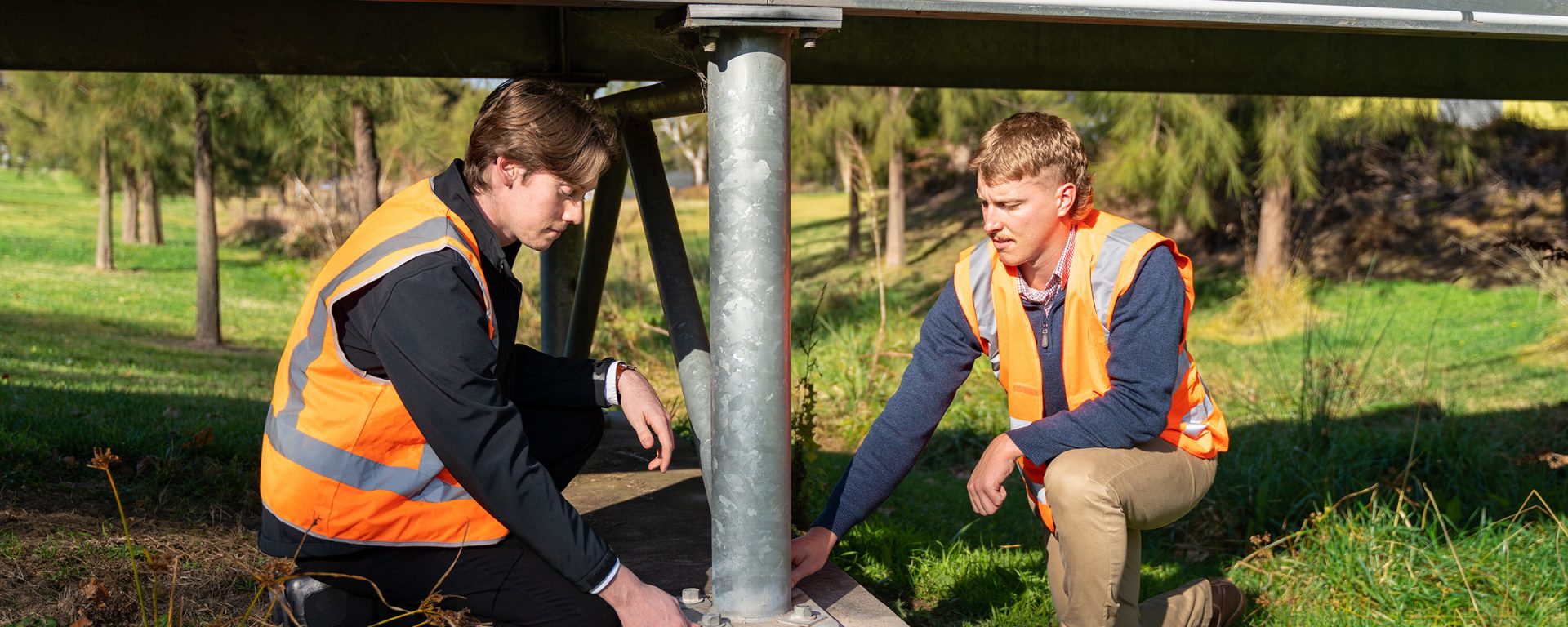There are heaps of ways to get the qualifications you need to land the job of your dreams. What’s the difference between apprenticeship and traineeship? And what about a uni degree? With so many options, which one is the best one?
Well, there’s no right or wrong answer here. Depending on your future goals, you could be better off doing vocational learning, going to uni or a mixture of both! Some careers require qualifications from one or the other. Some people learn better online or face-to-face; in a traditional lecture format or with on-the-job practice. It’s all up to what best suits you.
We’ll break down the differences and explain how to figure out which path is right for you.
A quick comparison

At a glance, the three different qualification styles might seem pretty similar, but there are definitely some differences. Most obviously, traineeships, apprenticeships and undergraduate degrees all have pretty significant differences in their career outcomes. It all depends on where you see yourself ending up in one, three or five years.
| Traineeships | Apprenticeships | Uni degrees | |
| Focus | Practical skills for service, admin and support roles | Trade-specific skills for areas like construction | Professional and academic preparation for advanced careers |
| Duration | One to two years | Three to four years | Three to four years for a full-time degree |
| Qualification | Certificates II–IV or a diploma or advanced diploma | Certificate III–IV and a trade licence | Bachelor’s degree, or further study |
| Career path | Entry-level jobs in admin, IT, retail and healthcare | Skilled tradespeople like plumbers, electricians and carpenters | Professional careers like teaching, nursing, engineering and psychology |
| Entry requirements | Usually finishing Year 10 or above | Usually finishing Year 10 or above | Year 12 final exam results, or an alternate entry pathway |
| Example career | Business admin trainee with your local council | Apprentice electrician in residential construction | Bachelor of Education (Primary) student prepping to become a primary school teacher |
Need some more clarification? We’ve got you. Read on to get into the nitty-gritty about how these three paths differ.
What are traineeships and apprenticeships?

Traineeships and apprenticeships can seem pretty similar: they’re both structured training opportunities that incorporate a lot of on-the-job learning. They’re also typically shorter and less academically intensive than degrees.
But what’s the difference between apprenticeship and traineeship? Well, a traineeship usually leads to office, administration and support types of roles, whereas Australian apprenticeships usually lead to a trade.
However, they’re both nationally recognised formal training programs that follow a specific structure and have specific outcomes. One of the benefits of an apprenticeship or traineeship is that you’ll come out ready for the jobs and skills Australia needs. Lots of employers will look forward to hiring an apprentice since they train you exactly the way they like things done.
There are also school-based apprenticeships and traineeships, where you take on a traineeship or apprenticeship while you’re still at school in partnership with a training provider. You’ll graduate with a qualification and lots of employment opportunities right out of the door.
As a bonus, you’ll be paid for the work you’re performing from day one, so you get training and development and a qualification and you’re getting the dosh! Win-win-win!
A traineeship
- Usually leads to an admin or support role
- Good for jobs in areas like retail, hospitality, healthcare or customer service
- Paid for your work (pay rates can depend on the job and qualification)
- Nationally recognised qualification
- Finish with a qualification (Certificate II–IV or a diploma)
An apprenticeship
- Usually leads into a trade
- Good for skilled trade jobs like as an electrician, carpenter or plumber
- Paid for your work (pay rates can depend on the job and qualification)
- Nationally recognised qualification
- Finish with a qualification (Certificate III or IV, and a trade licence)
So then what’s a uni degree?

A degree is a qualification given to show that you’ve successfully reached a certain level of knowledge in your field. Degrees are usually broader than an apprenticeship or traineeship. They prepare students for professional or leadership roles, or help them advance further in their current field or job.
Uni degrees
- Take around three to four years (when studying full-time for a bachelor’s degree)
- Have a deeper focus on academic outcomes and research
- Will combine theory with hands-on practice and industry connections
- Grant entry into professional fields, like nursing, teaching or engineering
- Can also be a pathway to further study, like a master’s or other postgraduate qualifications
Charles Sturt has a range of degrees across a vast number of jobs and careers. Whether you’re wanting to study in person or online, if you’re upskilling in your current job or thinking or a career change, whether you’re here full-time or fitting study part-time around other commitments, we’ve got the option for you. Get in touch with us to find out what your best fit might be.
Which one is right for you?

All the paths we’ve mentioned here are different, but one thing’s for sure – no one path is perfectly right for everyone. It all depends on what suits your future goals, your learning style and your circumstances.
To figure out the difference between apprenticeships, traineeship, and uni degrees and what they can do for you, you’ve got to think about what you want. Ask yourself: what do I want to get out of my qualification? Is it a head-start into an entry-level job? Is it a trade that I can build into a career? Or is it a stepping stone toward a professional role?
Some more questions to ask:
- Do I prefer to learn by doing or do I like reading and thinking about concepts and ideas?
- Am I looking to start earning immediately or am I willing to make sacrifices now for a potentially larger income later?
- Do I have a specific career in mind? What kind of qualification is needed for that career?
- Do I want to keep studying after I get this qualification? How can I build on what I get?
While vocational pathways offer a fast track to employment, a university degree can open doors to higher-level roles, long-term salary growth and broader career flexibility.
Pathways into uni – even if school wasn’t your thing
Didn’t finish Year 12? Didn’t get the ATAR you wanted? Don’t stress – there are still plenty of ways to get into uni. Charles Sturt has a range of admissions pathways, including:
Early entry options
- Charles Sturt Advantage, which offers guaranteed early entry to a range of courses based on your Year 11 results and your answers to questions about your soft skills.
- The Schools Recommendation Scheme, which gives you an early offer before your Year 12 exams based on a recommendation from your teachers and school staff.
Preparation and enabling courses
- Enabling courses, which are short, useful uni prep programs that end with a guaranteed entry offer.
- Undergraduate certificates, which offer a recognised qualification that might help you start your career or which you can build on to study a bachelor’s degree.
Direct entry and access programs
- Access schemes for a variety of students. From elite athlete and performer programs to schemes designed to make access easier if you’ve experienced personal challenges.
- Regional location adjustments, which grant you five extra selection rank points if you went to school in a regional area.
- Connections – First Nations Direct Entry Program, a five-day experience that culminates in guaranteed entry for eligible First Nations students.
Experience-based entry
- Veteran Pathway and Support Program, a dedicated entry scheme for veterans and currently-serving Australian Defence Force personnel.
- TAFE to uni pathways, a series of guaranteed entry options and partner pathways.
Study your way with Charles Sturt
Studying a degree with Charles Sturt means you’re getting all the outcomes of a world-class university with all the cushy benefits of a laid back, regional campus. We’ve got a range of flexible, career-focused degrees, short courses and microcredentials available across a huge range of areas, like education, health, IT, business, engineering and more.
Plus, we’re the #1 uni in Australia for grads who get jobs*. So you know you’re on the right path toward landing your dream career. Find the undergraduate degree for you. Need help with your career planning? Chat to us any time!
Frequently asked questions
Can I go to uni if I didn’t finish Year 12?
Absolutely. We believe uni is for everyone, which is why we’ve made a whole lot of different admissions pathways available for students like you. From guaranteed entry schemes, to uni preparation and enabling courses, to pathways designed just for First Nations students, students from the regions and veterans. We’ll help you get there and give you all the support you need to make the move into a rewarding career.
What’s the difference between an apprenticeship and a traineeship?
An apprenticeship and a traineeship are both qualifications that you can undertake to get paid work experience and on-the-job training. Apprentices and trainees both receive formal training from a registered training organisation (RTO), and both have the benefit of earning while you learn. However, they differ slightly in what careers you’re likely to get out of them.
An apprenticeship usually leads to a trade qualification, leading you toward being a skilled tradesperson like an electrician, plumber or carpenter. A traineeship is more for people wanting to go into admin, retail or customer service roles, and is great for getting a leg-up into an entry-level job.
Can you do an apprenticeship while you’re at uni?
One of the benefits of formal study with a uni degree is that you can study it part-time, taking on as few as one subject per semester. You can also study asynchronously online (that means whenever and wherever you want!) watching your lectures and doing your assignments at night, on weekends or around your work and life. However, an apprenticeship and a uni degree will generally lead in different directions – an apprenticeship to a trade, while a degree often leads towards professional careers.
It’s not impossible to do both but it would require a lot of effort and dedication and probably wouldn’t suit most people’s career plans. However, for the right person combining hands-on practice with academic knowledge could open some interesting doors.
Need to talk your plan through? Reach out to chat with someone about your study options and what will work best for you.
Can I study online at Charles Sturt?
Yes! Charles Sturt is Australia’s largest and most experienced online university^, with loads of fully-online or blended learning study options for almost every course you could think of. Browse our online course offerings.
*Public universities, Good Universities Guide 2024/25
^Department of Education, National Data Collection File, 2023


You must be logged in to post a comment.